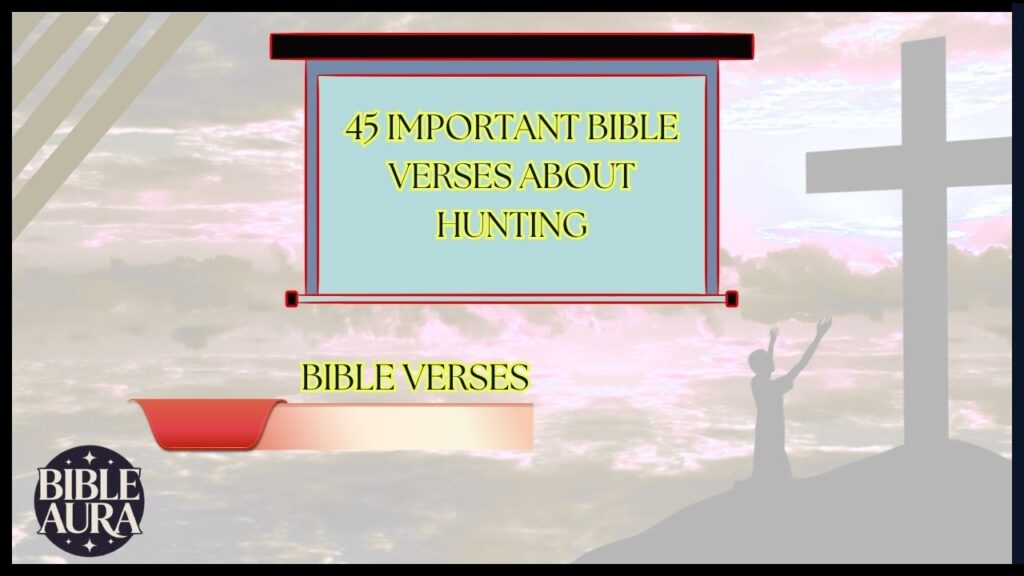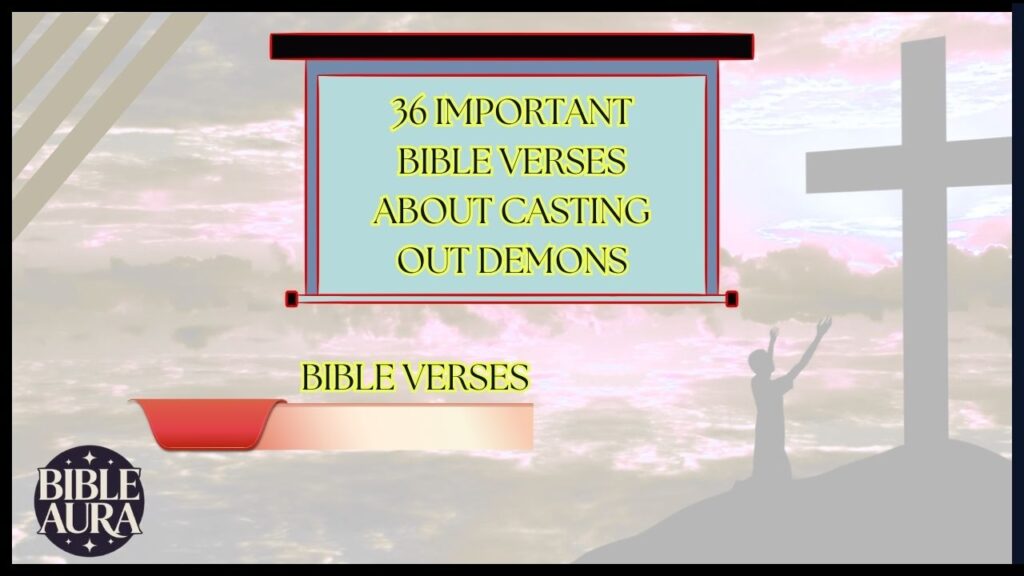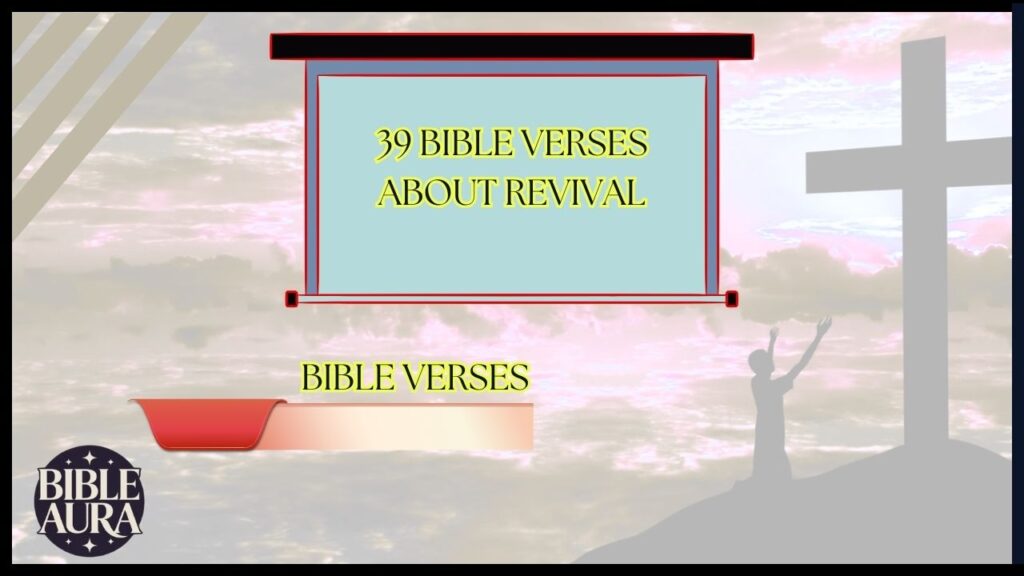Bible Verses About Hunting: Hunting has deep roots in biblical history, serving not only as a means of sustenance but also as a powerful metaphor throughout Scripture. From Nimrod, described as a “mighty hunter before the Lord,” to Esau’s skills that won his father’s favor, hunting appears throughout the Bible in literal and symbolic contexts.
For many Christians who hunt today, understanding what Scripture says about this practice provides spiritual guidance and a deeper connection to creation. These verses remind us of God’s provision, our stewardship responsibilities, and the biblical principles that should guide ethical hunting practices.
Whether you’re an experienced hunter seeking biblical wisdom or simply curious about what Scripture says on the topic, these verses offer valuable insights into how hunting fits within God’s design for humanity’s relationship with nature.
Also Read: 51 Bible Verses About Butterflies
God’s Provision Through Hunting
Genesis 27:3
“Now then, get your equipment your quiver and bow and go out to the open country to hunt some wild game for me.”
Isaac’s request to Esau highlights hunting as a legitimate means of provision. God designed certain animals for human consumption, and hunting was an honorable skill that provided for families. This reminds us that ethical hunting can be a way to participate in God’s provision for our needs.
Genesis 25:27
“When the boys grew up, Esau became a skillful hunter, a man of the field, but Jacob was a peaceful man, living in tents.”
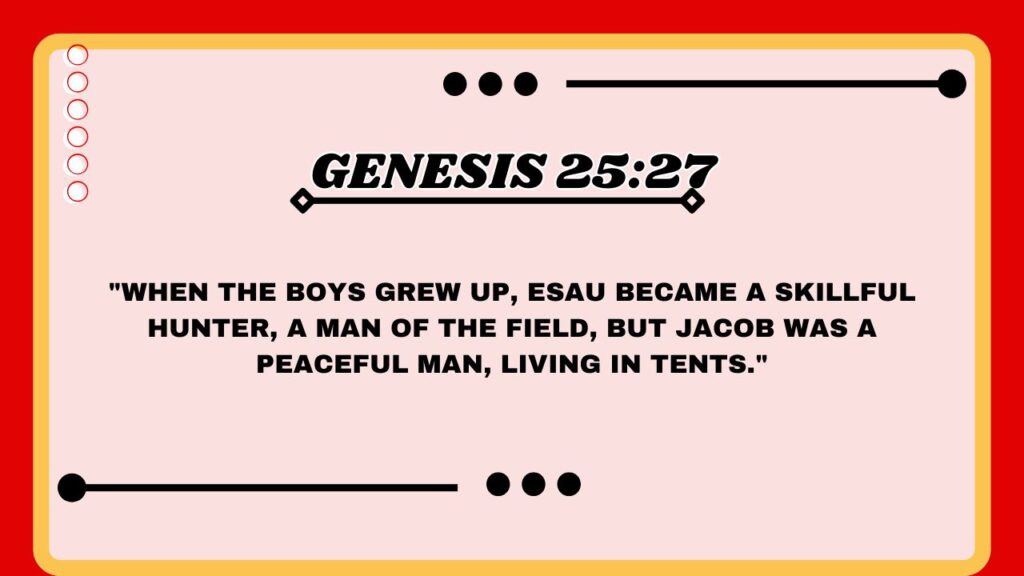
This verse acknowledges hunting as a legitimate occupation and skill set. Though the Bible doesn’t elevate hunting above other professions, it recognizes it as a valid way of life. This validates those who hunt as participating in an ancient and honorable tradition when done with proper respect.
Proverbs 12:27
“The lazy do not roast any game, but the diligent feed on the riches of the hunt.”
Solomon contrasts laziness with the diligence required for successful hunting. This proverb teaches that hunting requires work ethic, patience, and skill qualities that God values. When we approach hunting with diligence, we honor God through our efforts and stewardship of His resources.
Genesis 10:9
“He was a mighty hunter before the Lord; that is why it is said, ‘Like Nimrod, a mighty hunter before the Lord.'”
This reference to Nimrod acknowledges hunting prowess as a notable skill. The phrase “before the Lord” suggests that hunting happened under God’s watchful eye. This reminds us that our hunting practices should always recognize God’s sovereignty over all creation.
Leviticus 17:13
“Any Israelite or any foreigner residing among you who hunts any animal or bird that may be eaten must drain out the blood and cover it with earth.”
God gave specific instructions for hunters, showing that hunting was permitted within certain boundaries. This law emphasized respect for the life being taken by properly handling the blood. Today, this principle reminds us to hunt ethically, utilize what we harvest, and show respect for the animals we take.
Also Read: 40 Important Bible Verses About Enemies
Stewardship and Ethical Hunting
Genesis 1:26
“Then God said, ‘Let us make mankind in our image, in our likeness, so that they may rule over the fish in the sea and the birds in the sky, over the livestock and all the wild animals, and over all the creatures that move along the ground.'”
This foundational verse establishes humanity’s dominion over animals, including those hunted. However, biblical dominion implies responsible stewardship, not exploitation. When hunting, we should remember our God-given authority comes with the responsibility to manage wildlife populations ethically.
Genesis 9:2-3
“The fear and dread of you will fall on all the beasts of the earth, and on all the birds in the sky, on every creature that moves along the ground, and on all the fish in the sea; they are given into your hands. Everything that lives and moves about will be food for you. Just as I gave you the green plants, I now give you everything.”
After the flood, God explicitly permitted animals for food. This divine permission forms a biblical foundation for hunting. When we hunt, we can do so with the confidence that God has provided these creatures as a resource, while still maintaining our responsibility to be good stewards.
Deuteronomy 22:6-7
“If you come across a bird’s nest beside the road, either in a tree or on the ground, and the mother is sitting on the young or on the eggs, do not take the mother with the young. You may take the young, but be sure to let the mother go, so that it may go well with you and you may have a long life.”
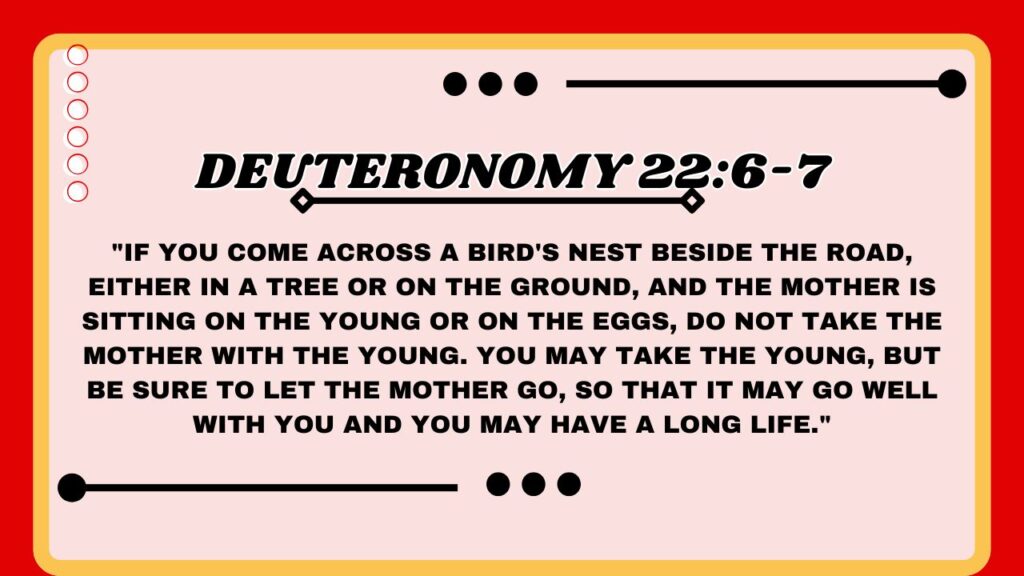
This passage teaches conservation principles protecting breeding stock to ensure future populations. This early wildlife management law reminds hunters to consider the sustainability of animal populations, taking only what’s needed and ensuring species can thrive for future generations.
Psalm 104:21
“The lions roar for their prey and seek their food from God.”
This psalm recognizes that even predatory behavior is part of God’s design. It reminds hunters that predator-prey relationships are established by God. Ethical hunting acknowledges this natural order while practicing responsible conservation that maintains ecological balance.
Proverbs 6:5
“Free yourself, like a gazelle from the hand of the hunter, like a bird from the snare of the fowler.”
This proverb uses hunting imagery to illustrate escaping danger. It acknowledges hunting as a common practice while using it as a metaphor. This reminds us that hunting terminology was well understood in biblical times and formed part of the cultural understanding.
Also Read: 48 Bible Verses About Retirement (Explained)
Hunting as Metaphor in Scripture
Psalm 91:3
“Surely he will save you from the fowler’s snare and from the deadly pestilence.”
God is portrayed as a protector from dangers, including hunting traps. This metaphor uses hunting imagery to illustrate spiritual protection. We can appreciate how God uses the familiar concept of hunting to help us understand spiritual truths about His protection.
Proverbs 1:17
“How useless to spread a net where every bird can see it!”
Solomon uses hunting knowledge to illustrate the foolishness of obvious traps. This proverb assumes readers understand basic hunting principles. It reminds us that biblical wisdom often draws on practical knowledge, including hunting skills, to convey deeper truths.
Ecclesiastes 3:1,5
“There is a time for everything, and a season for every activity under the heavens… a time to scatter stones and a time to gather them, a time to embrace and a time to refrain from embracing.”
Though not explicitly about hunting, this passage teaches about appropriate seasons for different activities. This principle applies to hunting seasons, which recognize animal breeding cycles and population needs. Respecting hunting seasons demonstrates godly stewardship and patience.
Jeremiah 16:16
“‘But now I will send for many fishermen,’ declares the Lord, ‘and they will catch them. After that I will send for many hunters, and they will hunt them down on every mountain and hill and from the crevices of the rocks.'”
God uses hunting imagery to describe His pursuit of His people for judgment. This metaphor shows God’s understanding of hunting techniques and their effectiveness. It reminds us that God can use even hunting imagery to communicate important spiritual truths.
Amos 3:5
“Does a bird swoop down to a trap on the ground when no bait is there? Does a trap spring up from the ground if it has not caught anything?”
The prophet uses hunting knowledge to illustrate cause and effect. This demonstrates that understanding hunting principles was common knowledge used to convey deeper truths. Hunters can appreciate how their practical knowledge connects to biblical wisdom.
Also Read: 56 Important Bible Verses About Overcoming
Hunting for Sustenance
1 Samuel 26:20
“Now do not let my blood fall to the ground far from the presence of the Lord. The king of Israel has come out to look for a flea as one hunts a partridge in the mountains.”
David uses partridge hunting as a metaphor for Saul’s pursuit. This reference indicates partridge hunting was common practice. This reminds us that hunting small game for food was a normal part of biblical life, providing context for our modern hunting practices.
2 Samuel 2:18
“The three sons of Zeruiah were there: Joab, Abishai and Asahel. Now Asahel was as fleet-footed as a wild gazelle.”
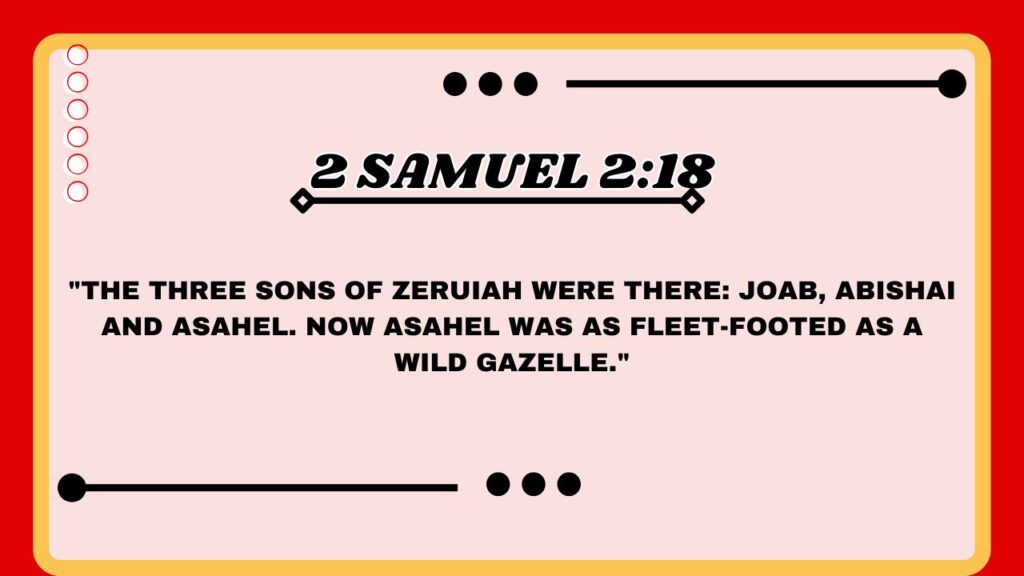
The comparison to a wild gazelle indicates familiarity with this animal’s speed. This reference shows knowledge of wildlife behavior gained through hunting and observation. Understanding animal behavior remains an important aspect of ethical hunting today.
Psalm 124:7
“We have escaped like a bird from the fowler’s snare; the snare has been broken, and we have escaped.”
This psalm uses bird hunting imagery to describe deliverance. The metaphor assumes familiarity with trapping techniques. This reminds us that hunting methods were well-understood and provided powerful imagery for spiritual truths about freedom and deliverance.
Isaiah 51:20
“Your children have fainted; they lie at every street corner, like antelope caught in a net. They are filled with the wrath of the Lord, with the rebuke of your God.”
The prophet uses hunting imagery to illustrate helplessness. This metaphor draws on the common understanding of trapped animals. It reminds us that biblical authors recognized the vulnerability of caught prey a humbling reminder of the responsibility hunters have toward their quarry.
Job 41:1-2
“Can you pull in Leviathan with a fishhook or tie down its tongue with a rope? Can you put a cord through its nose or pierce its jaw with a hook?”
God uses hunting/fishing imagery to highlight human limitations compared to certain creatures. This passage reminds hunters of the proper humility before creation. We should approach hunting with respect for the creatures God has made, recognizing our limitations.
Also Read: 40 Bible Verses About Blooming Where You Are Planted
Biblical Figures and Hunting
Genesis 21:20
“God was with the boy as he grew up. He lived in the desert and became an archer.”
This verse about Ishmael mentions his development as an archer. Archery skills were valuable for hunting and protection. This reminds us that developing hunting skills can be compatible with God’s blessing and provision.
Genesis 25:28
“Isaac, who had a taste for wild game, loved Esau, but Rebekah loved Jacob.”
This verse mentions Isaac’s preference for wild game. It acknowledges the value of hunting for providing special foods. This affirms the legitimacy of enjoying the fruits of the hunt as part of God’s provision.
Genesis 27:5
“Now Rebekah was listening as Isaac spoke to his son Esau. When Esau left for the open country to hunt game and bring it back.”
This passage shows hunting as a normal activity within family dynamics. Hunting provided food and fulfilled family responsibilities. This reminds us that hunting can strengthen family bonds and teach important values across generations.
2 Kings 13:15-17
“Elisha said, ‘Get a bow and some arrows,’ and he did so. ‘Take the bow in your hands,’ he said to the king of Israel. When he had taken it, Elisha put his hands on the king’s hands. ‘Open the east window,’ he said, and he opened it. ‘Shoot!’ Elisha said, and he shot.”
The prophet uses archery skills (related to hunting) as a prophetic symbol. This shows how hunting implements could serve multiple purposes. This reminds us that hunting tools and skills have both practical and symbolic significance in Scripture.
1 Chronicles 12:2
“They were armed with bows and were able to shoot arrows or to sling stones right-handed or left-handed; they were relatives of Saul from the tribe of Benjamin.”
This verse mentions archery skills in a military context. Hunting skills transferred to other important areas of life. This shows how hunting abilities developed for food could also serve in protection and defense when needed.
Also Read: 53 Bible Verses About Resilience (Explained)
Respect for Wildlife and Creation
Psalm 50:10-11
“For every animal of the forest is mine, and the cattle on a thousand hills. I know every bird in the mountains, and the insects in the fields are mine.”
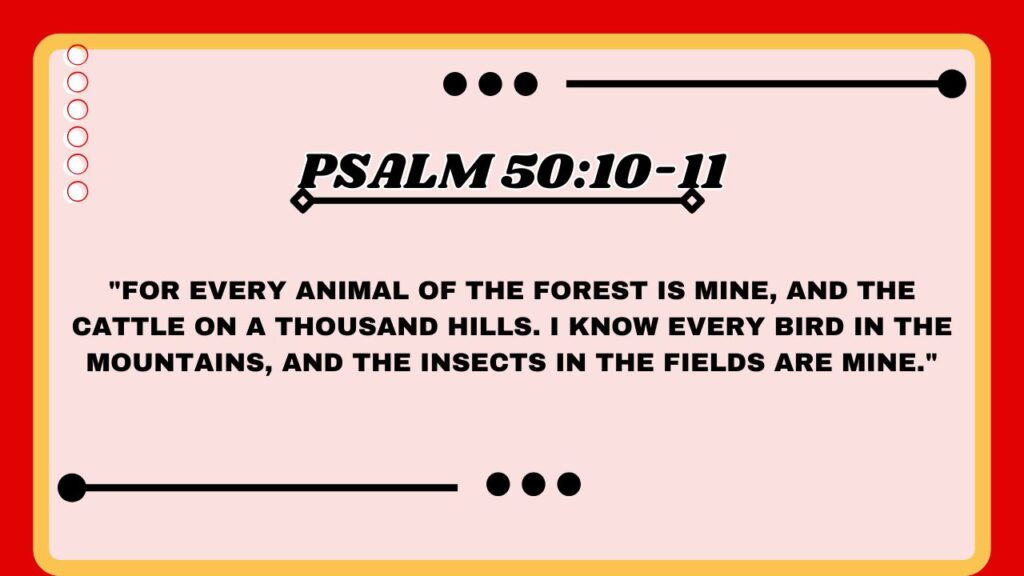
This psalm reminds us that all animals ultimately belong to God. This establishes God’s ultimate ownership of wildlife. Hunters should remember they’re harvesting what belongs to God, requiring a humble and thankful approach.
Job 12:7-10
“But ask the animals, and they will teach you, or the birds in the sky, and they will tell you; or speak to the earth, and it will teach you, or let the fish in the sea inform you. Which of all these does not know that the hand of the Lord has done this? In his hand is the life of every creature and the breath of all mankind.”
Job recognizes animals as part of God’s testimony in creation. This passage encourages respect and observation of wildlife. Hunters who spend time observing animals often develop a deeper appreciation for God’s design and creativity.
Proverbs 27:23-24
“Be sure you know the condition of your flocks, give careful attention to your herds; for riches do not endure forever, and a crown is not secure for all generations.”
Though addressing livestock, this principle applies to wildlife management. It encourages awareness of animal populations and needs. Ethical hunters should understand wildlife populations and their health before harvesting.
Psalm 104:24-25
“How many are your works, Lord! In wisdom you made them all; the earth is full of your creatures. There is the sea, vast and spacious, teeming with creatures beyond number living things both large and small.”
This psalm celebrates the diversity of God’s creatures. It encourages appreciation for the variety in creation. Hunters should approach their activity with wonder at God’s creative design, seeing animals as magnificent examples of divine creativity.
Matthew 10:29
“Are not two sparrows sold for a penny? Yet not one of them will fall to the ground outside your Father’s care.”
Jesus teaches that God values even small creatures. This shows God’s attention to individual animals. This should inspire hunters to treat all game with respect, knowing that God notices how we interact with His creation.
Also Read: 40 Amazing Bible Verses About Sunsets
Spiritual Lessons from Hunting
Jeremiah 9:23
“This is what the Lord says: ‘Let not the wise boast of their wisdom or the strong boast of their strength or the rich boast of their riches.'”
While not directly about hunting, this applies to hunting success. It warns against pride in skills or accomplishments. Successful hunters should remain humble, recognizing that their skills and opportunities come from God.
Psalm 33:16-17
“No king is saved by the size of his army; no warrior escapes by his great strength. A horse is a vain hope for deliverance; despite all its great strength it cannot save.”
This principle reminds us that outcomes ultimately depend on God, not just skill. Hunting success isn’t guaranteed by equipment or experience alone. This teaches hunters to remain dependent on God rather than trusting solely in their abilities.
Ecclesiastes 9:11
“I have seen something else under the sun: The race is not to the swift or the battle to the strong, nor does food come to the wise or wealth to the brilliant or favor to the learned; but time and chance happen to them all.”
Solomon acknowledges the unpredictability in outcomes, including hunting. Success isn’t guaranteed even with skill and preparation. This teaches hunters patience and humility, recognizing that many factors beyond our control affect hunting outcomes.
Romans 14:6
“Whoever regards one day as special does so to the Lord. Whoever eats meat does so to the Lord, for they give thanks to God; and whoever abstains does so to the Lord and gives thanks to God.”
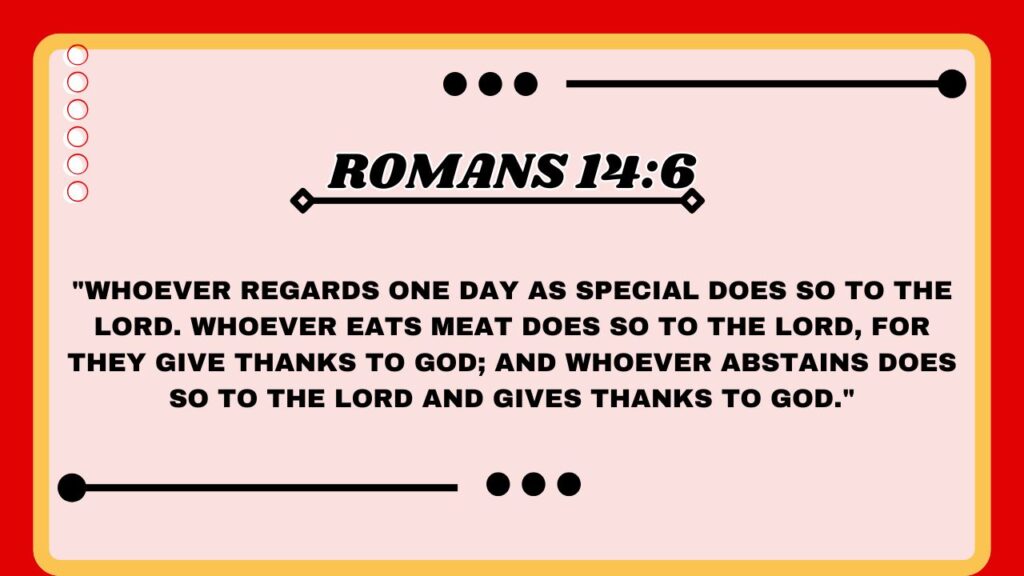
Paul affirms that eating meat (including hunted game) can honor God. This validates hunting for food when done with thanksgiving. Hunters should approach their harvest with gratitude, acknowledging God as the ultimate provider.
1 Timothy 4:4-5
“For everything God created is good, and nothing is to be rejected if it is received with thanksgiving, because it is consecrated by the word of God and prayer.”
Paul teaches that all food, including wild game, is acceptable. This affirms hunting for food as legitimate for Christians. Hunters can confidently enjoy their harvest, recognizing it as part of God’s good provision when received with thankfulness.
Also Read: 45 Bible Verses About Gossip and Slander (Explained)
Spiritual Hunting Parallels
Psalm 42:1
“As the deer pants for streams of water, so my soul pants for you, my God.”
The psalmist uses wildlife behavior to illustrate spiritual longing. This metaphor draws on observations of animals in nature. Hunters who observe wildlife can appreciate these spiritual parallels in animal behavior.
Psalm 18:33-34
“He makes my feet like the feet of a deer; he causes me to stand on the heights. He trains my hands for battle; my arms can bend a bow of bronze.”
David uses hunting skills as metaphors for God’s empowerment. This connects physical abilities to spiritual strength. Hunters can see their skills as gifts from God that may have spiritual applications beyond the hunt.
Lamentations 3:10-11
“Like a bear lying in wait, like a lion in hiding, he dragged me from the path and mangled me and left me without help.”
Jeremiah uses predator behavior to describe feeling pursued. This imagery draws on understanding of predator tactics. Hunters who understand predator behavior can appreciate the depth of these biblical metaphors.
Habakkuk 3:19
“The Sovereign Lord is my strength; he makes my feet like the feet of a deer, he enables me to tread on the heights.”
The prophet uses deer agility as a metaphor for God-given ability. This shows appreciation for wildlife capabilities. Hunters who observe deer’s remarkable agility can better understand this powerful spiritual metaphor.
Mark 1:17
“‘Come, follow me,’ Jesus said, ‘and I will send you out to fish for people.'”

Jesus uses fishing (similar to hunting) as a metaphor for evangelism. This connects familiar skills to spiritual mission. While specifically about fishing, this principle applies to hunting as well God can use our outdoor skills and experiences for higher purposes.
Conclusion: Bible Verses About Hunting
These 45 Bible verses reveal that hunting is woven throughout Scripture both as literal practice and powerful metaphor. From God’s first instructions about dominion to Jesus’ use of outdoor imagery in teaching, hunting provides a rich biblical backdrop for understanding our relationship with creation and Creator.
For today’s hunters, these passages offer both validation and guidance. They affirm hunting as a legitimate means of providing food while establishing clear principles of respect, conservation, and gratitude. They remind us that all creation belongs to God, and our hunting practices should reflect good stewardship of His resources.
As you reflect on these verses, remember that ethical hunting can be an act of worship acknowledging God’s provision, practicing proper stewardship, and receiving His gifts with thanksgiving. When approached with the right heart and practices, hunting becomes not just a recreational activity but a meaningful connection to biblical principles and God’s creation.
Bonus: Practical Applications for Hunters
Devotional Ideas for Hunters
- Create a small weatherproof journal with relevant verses to reflect on during hunting trips
- Begin hunting trips with prayer, acknowledging God’s ownership of all creation
- Practice thankfulness by saying a specific prayer of gratitude when harvesting an animal
- Use waiting time in blinds or stands for Scripture meditation and prayer
Teaching Opportunities
- Mentor young hunters using biblical principles of respect for wildlife and ethical harvest
- Discuss God’s design evident in animal adaptations and behaviors observed while hunting
- Share hunting stories that illustrate biblical principles like patience, stewardship, and provision
Conservation Application
- Support wildlife conservation efforts as an expression of biblical stewardship
- Practice selective harvesting that considers animal populations and breeding cycles
- Utilize as much of harvested animals as possible to honor the life taken
Community Engagement
- Share harvested meat with those in need, reflecting God’s generosity
- Organize faith-based hunting groups that emphasize biblical ethics and conservation
- Volunteer for habitat restoration projects as an expression of creation care
FAQs About Biblical Perspectives on Hunting
Does the Bible condemn or support hunting?
The Bible neither condemns nor explicitly promotes hunting as we understand it today. Scripture acknowledges hunting as a legitimate means of providing food and uses hunting imagery extensively in metaphors. The Bible establishes principles for ethical treatment of animals and proper stewardship of resources that should guide hunting practices.
What does the Bible say about hunting for sport versus necessity?
The Bible primarily portrays hunting as a means of providing food. While it doesn’t directly address recreational hunting, biblical principles suggest that harvesting animals should be done with purpose, respect, and good stewardship. This would indicate that even when hunting for recreation, utilizing the harvest and respecting the animal’s life are important considerations.
How should Christians approach conservation and hunting?
Christians should approach conservation as an extension of their God-given responsibility to be good stewards of creation. Biblical passages like Deuteronomy 22:6-7 establish early conservation principles. Christian hunters should support wildlife management practices that ensure sustainable populations and healthy habitats.
What biblical principles should guide ethical hunting practices?
Key biblical principles include: recognizing God’s ultimate ownership of all creatures, showing respect for the life being taken, utilizing what is harvested, practicing conservation that ensures sustainable populations, expressing gratitude for the provision, and adhering to laws and regulations (Romans 13:1-7).
How can hunting be a spiritual experience?
Hunting can become spiritual when approached mindfully. Time in creation provides opportunity for prayer, reflection, and appreciation of God’s design. The disciplines of patience, observation, and respect required for ethical hunting parallel spiritual disciplines. Harvesting and sharing meat can become acts of thanksgiving and generosity that honor God.
Read more knowledgeable blogs on Bible Aura

Piper McMillan is a passionate writer and educator dedicated to sharing the beauty and depth of the Bible. As the author behind the Piper McMillan website, she explores Bible verses, unlocks biblical narratives, and provides insights for living a Christ-centered life. Through warm, approachable, and inspiring articles, Piper guides readers to deepen their understanding of Scripture and apply its timeless wisdom to daily living. Her mission is to uplift, educate, and help others walk faithfully with God, rooted in His word.

